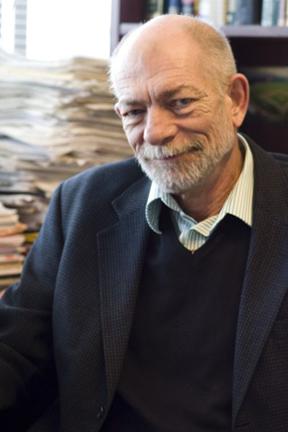
Duane Shank was Associate Editor for Sojourners magazine and was on the staff from 1995 to 2014.
Duane has been active as an organizer and administrator in the peace and justice movement for 35 years, beginning as a draft resistance and antiwar organizer during the Vietnam war. He has worked as a community organizer in the rural south, in interfaith coalitions, and in the nuclear weapons freeze and Central America solidarity movements of the 1980s. His positions have included Associate for the National Inter-religious Service Board for Conscientious Objectors; National Coordinator for the Committee Against Registration and the Draft; Deputy Director and Acting Executive Director for SANE/Freeze; and Research Fellow for the Institute for Policy Studies.
Duane attended Eastern Mennonite University. He is a Anabaptist/Mennonite, and currently an active member and serves on the worship leadership team of the Community of Christ ecumenical congregation in the Mt. Pleasant neighborhood of Washington, D.C. His views on faith and politics have been shaped by (among others), John Howard Yoder, Abraham Joshua Heschel, Martin Luther King, Jr., Dietrich Bonhoeffer, and Oscar Romero.
Duane is married to Ellen Kennel. They have a daughter, Celeste, a graduate of Goshen College, IN, the Medill School of Journalism at Northwestern University, and the University of Chicago Divinity School.
In addition to family, church, and work; his passions are baseball (Washington Nationals), blues (Buddy Guy and Stevie Ray Vaughan) and bluegrass music (Ralph Stanley), and barbecue.
Posts By This Author
The (Church and) State of Our Schools
Kosovo: Find the way forward
An Imperative to Overcome Poverty
The Subcontinent Goes Nuclear
The post-Cold War dream of a world free from nuclear weapons had a rude awakening this May. India’s five nuclear tests and Pakistan’s even more provocative response are a major setback to nuclear non-proliferation and threaten a dangerous arms race in South Asia, one of the world’s most likely nuclear flash points.
Pakistan’s deployment of nuclear warheads on its long-range Ghauri missiles makes an already deteriorating situation even more dangerous. Both India and Pakistan have been suspected for decades of having nuclear capability. This spring’s tests removed any doubt and will accelerate the arms race between the two—and could make a future nuclear exchange a real possibility. China is unlikely to sit idly by and may now increase its nuclear arsenal targeted at India.
After 24 years of ambiguity, why did India risk a regional arms race, international condemnation, and sanctions by testing nuclear weapons? There are several immediate reasons.
Geopolitics. In the past 50 years, India and Pakistan have fought three wars over Kashmir, and since India’s 1962 war with China the country has lived in fear of further attacks. In recent years, the Clinton administration has allowed China to acquire previously forbidden military, nuclear, supercomputer, and satellite technology, which China allegedly then made available to Pakistan. Only one month before India’s test, Pakistan for the first time successfully tested a ballistic missile capable of reaching India’s major cities. India has increasingly felt the regional balance changing to its detriment.
Building Common Ground
One of the most important goals of the Call to Renewal is to unite Christians who traditionally have not worked together, on the issue of poverty. We are using the metaphor of a "roundtable" to describe a new partnership. These local roundtables are not a new organization, but a table that can bring people together for common action.
Organizing these local roundtables is a central part of the development of the Call to Renewal network. It is an opportunity to build new relationships and connections, to engage in vital discussion about the church’s responsibility to the poor. It is a chance to discover new ideas, to explore common ground, and to profile some of the best faith-based programs in the community. An active roundtable can strengthen the voice and impact of the churches in the debate and process of welfare reform in their community and in the deeper biblical mission of overcoming poverty in our society.
Bringing together the right people for planning a roundtable is critical to its success. Representatives from the key Call to Renewal constituency groups—evangelicals, Catholics, historic black churches, Pentecostal, and mainline Protestant—should form the core of the table. Service providers, advocacy groups, local officials, and the business community then round it out.
In many communities, some of these groups already meet together; in very few are they all together. Call to Renewal is becoming the opportunity and the catalyst to bring together a full table. These new multisector partnerships working together can make a significant difference in most communities.
Local Work on a National Problem
Pray, Teach, and Share
A Table in the Wilderness
The Common Good
A Different Christian Politics
On the Road
Call to renewal: News from the network